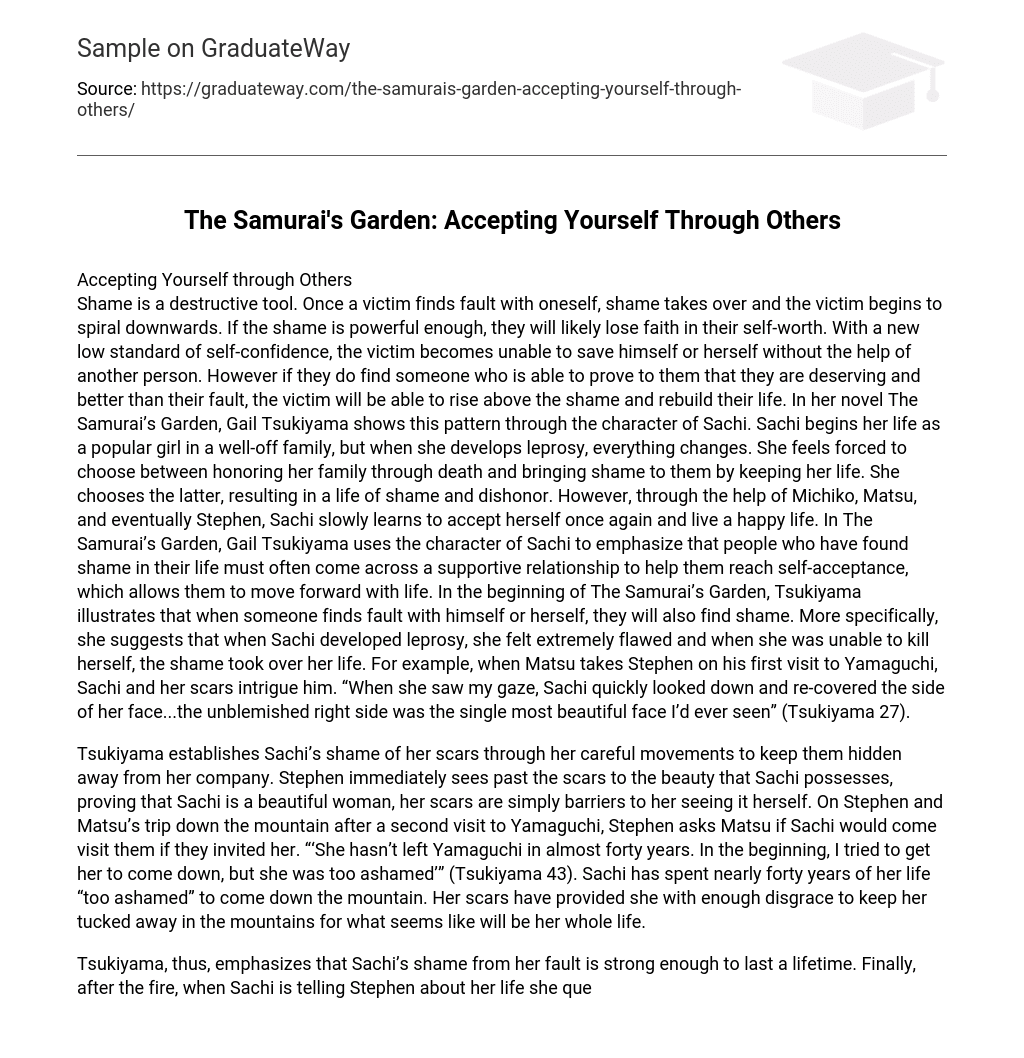Accepting Yourself through Others
Shame is a destructive tool. Once a victim finds fault with oneself, shame takes over and the victim begins to spiral downwards. If the shame is powerful enough, they will likely lose faith in their self-worth. With a new low standard of self-confidence, the victim becomes unable to save himself or herself without the help of another person. However if they do find someone who is able to prove to them that they are deserving and better than their fault, the victim will be able to rise above the shame and rebuild their life. In her novel The Samurai’s Garden, Gail Tsukiyama shows this pattern through the character of Sachi. Sachi begins her life as a popular girl in a well-off family, but when she develops leprosy, everything changes. She feels forced to choose between honoring her family through death and bringing shame to them by keeping her life. She chooses the latter, resulting in a life of shame and dishonor. However, through the help of Michiko, Matsu, and eventually Stephen, Sachi slowly learns to accept herself once again and live a happy life. In The Samurai’s Garden, Gail Tsukiyama uses the character of Sachi to emphasize that people who have found shame in their life must often come across a supportive relationship to help them reach self-acceptance, which allows them to move forward with life. In the beginning of The Samurai’s Garden, Tsukiyama illustrates that when someone finds fault with himself or herself, they will also find shame. More specifically, she suggests that when Sachi developed leprosy, she felt extremely flawed and when she was unable to kill herself, the shame took over her life. For example, when Matsu takes Stephen on his first visit to Yamaguchi, Sachi and her scars intrigue him. “When she saw my gaze, Sachi quickly looked down and re-covered the side of her face…the unblemished right side was the single most beautiful face I’d ever seen” (Tsukiyama 27).
Tsukiyama establishes Sachi’s shame of her scars through her careful movements to keep them hidden away from her company. Stephen immediately sees past the scars to the beauty that Sachi possesses, proving that Sachi is a beautiful woman, her scars are simply barriers to her seeing it herself. On Stephen and Matsu’s trip down the mountain after a second visit to Yamaguchi, Stephen asks Matsu if Sachi would come visit them if they invited her. “‘She hasn’t left Yamaguchi in almost forty years. In the beginning, I tried to get her to come down, but she was too ashamed’” (Tsukiyama 43). Sachi has spent nearly forty years of her life “too ashamed” to come down the mountain. Her scars have provided she with enough disgrace to keep her tucked away in the mountains for what seems like will be her whole life.
Tsukiyama, thus, emphasizes that Sachi’s shame from her fault is strong enough to last a lifetime. Finally, after the fire, when Sachi is telling Stephen about her life she questions what she did in the past. “‘Even now, I don’t remember what I was thinking. The greatest honor I could have given my family was that of my death, and I ran from it. I was frightened at not fulfilling my obligation, not giving ko to my parents. Yet, there was a voice inside of me that kept telling me to escape” (Tsukiyama 137). Forty years later and Sachi still cannot figure out why she could not kill herself. It haunts her to this day, the shame and dishonor that she presented to her family. Through her memory, Tsukiyama demonstrates Sachi’s conflictions between what the “voice inside” of her was saying and what the social norm called her to do. With a flaw as big as leprosy and a scar that never lets her forget, Sachi must face a shame so great that it haunts her for decades after she makes her choice to live.





